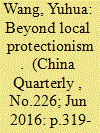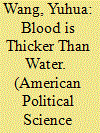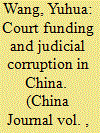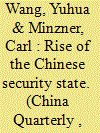| Srl | Item |
| 1 |
ID:
146511


|
|
|
|
|
| Summary/Abstract |
This article presents a large-scale, systematic study of politically connected firms in China. It was conducted by compiling a database of all the publicly traded firms in China in 1993, 2002 and 2012 that codes the biographies of hundreds of thousands of board members. I find that there has been a significant increase in the percentage of firms that are connected with the national government in the last 20 years. This casts doubt on a popular argument that businesses in China have primarily relied on “local protectionism.” I interpret this as a result of firms' need to connect with powerful and stable institutions. I test this by examining the impact of the fall of Chen Liangyu on firms in Shanghai.
|
|
|
|
|
|
|
|
|
|
|
|
|
|
|
|
| 2 |
ID:
186688


|
|
|
|
|
| Summary/Abstract |
A long tradition in social sciences scholarship has established that kinship-based institutions undermine state building. I argue that kinship networks, when geographically dispersed, cross-cut local cleavages and align the incentives of self-interested elites in favor of building a strong state, which generates scale economies in providing protection and justice throughout a large territory. I evaluate this argument by examining elite preferences related to a state-building reform in eleventh century China. I map politicians’ kinship networks using their tomb epitaphs and collect data on their political allegiances from archival materials. A statistical analysis demonstrates that a politician’s support for state building increases with the geographic size of his kinship network, controlling for a number of individual, family, and regional characteristics. My findings highlight the importance of elite social structure in facilitating state development and help to advance our understanding of state building in China—a useful, yet understudied, counterpoint to the Eurocentric literature.
|
|
|
|
|
|
|
|
|
|
|
|
|
|
|
|
| 3 |
ID:
119710


|
|
|
| 4 |
ID:
141092


|
|
|
|
|
| Summary/Abstract |
How does the Chinese Communist Party (CCP) secure the loyalty of its coercive leaders, and its public security chiefs in particular, in the face of numerous domestic protests every year? This article presents the first quantitative analysis of contemporary China's coercive leaders using an original data set of provincial public security chiefs and public security funding during the reform era. I demonstrate that the CCP, owing to its concern for regime stability, has empowered the public security chiefs by incorporating them into the leadership team. Empowered public security chiefs then have stronger bargaining power over budgetary issues. I rely on fieldwork, qualitative interviews and an analysis of Party documents to complement my statistical analysis. The findings of this analysis shed light on the understanding of regime durability, contentious politics and the bureaucracy in China.
|
|
|
|
|
|
|
|
|
|
|
|
|
|
|
|
| 5 |
ID:
139556


|
|
|
|
|
| Summary/Abstract |
Over the past two decades, the Chinese domestic security apparatus has expanded dramatically. “Stability maintenance” operations have become a top priority for local Chinese authorities. We argue that this trend goes back to the early 1990s, when central Party authorities adopted new governance models that differed dramatically from those of the 1980s. They increased the bureaucratic rank of public security chiefs within the Party apparatus, expanded the reach of the Party political-legal apparatus into a broader range of governance issues, and altered cadre evaluation standards to increase the sensitivity of local authorities to social unrest. We show that the origin of these changes lies in a policy response to the developments of 1989–1991, namely the Tiananmen democracy movement and the collapse of communist political systems in Eastern Europe. Over the past twenty years, these practices have developed into an extensive stability maintenance apparatus, whereby local governance is increasingly oriented around the need to respond to social unrest, whether through concession or repression. Chinese authorities now appear to be rethinking these developments, but the direction of reform remains unclear.
|
|
|
|
|
|
|
|
|
|
|
|
|
|
|
|
| 6 |
ID:
139557


|
|
|